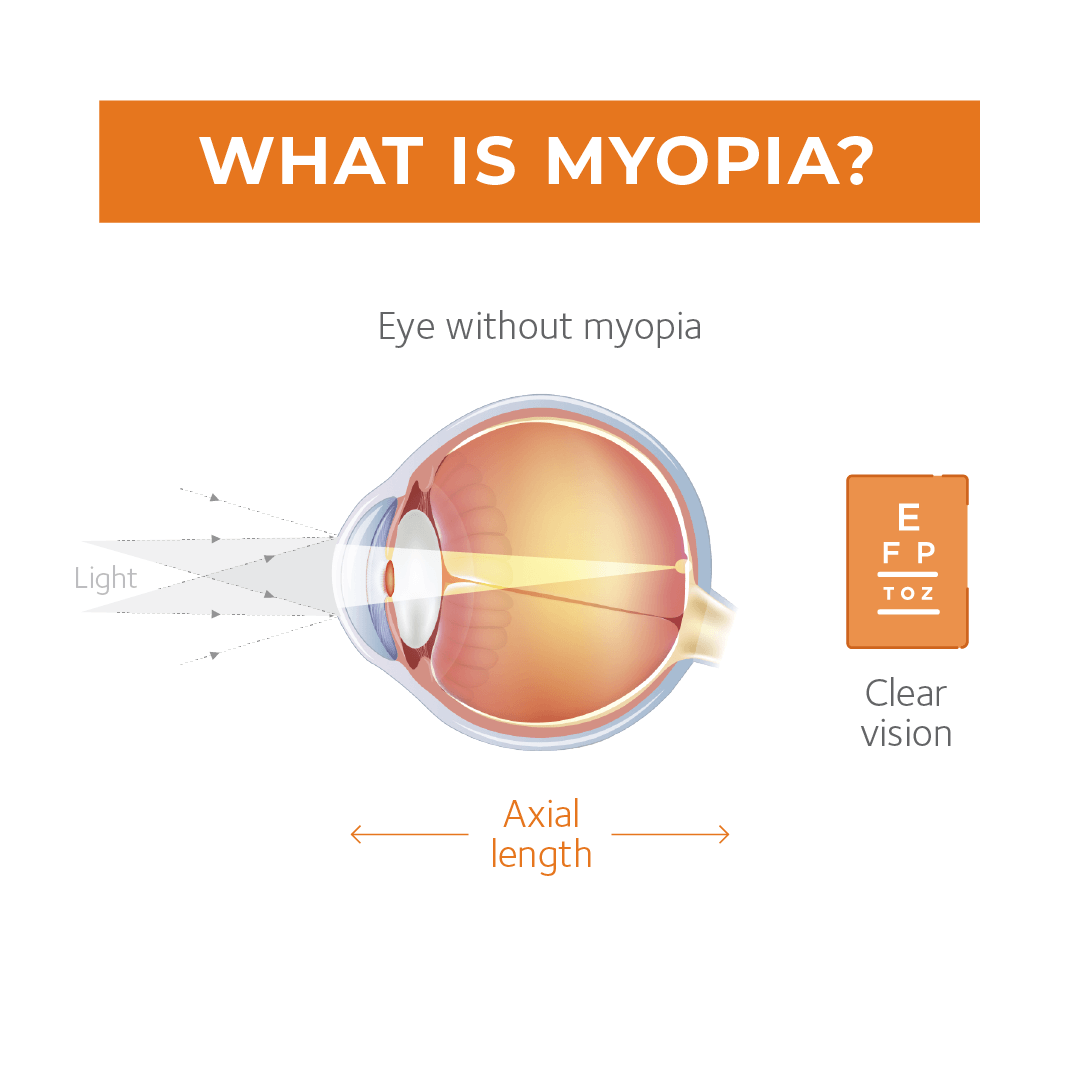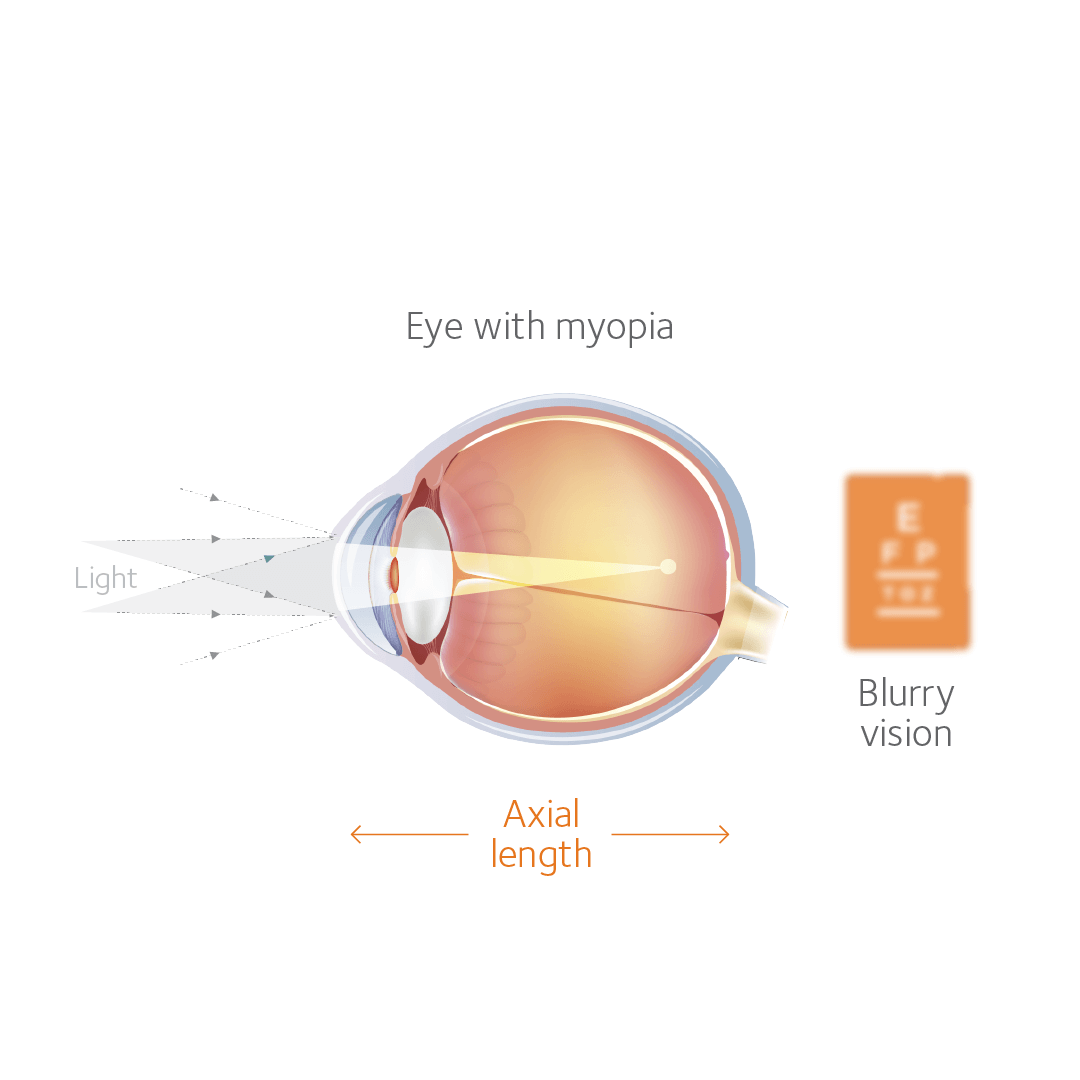Myopia Management
Ensure a lifetime of clear vision for your child

Meet Dr. Jones
Dr. David Jones is Utah Valley Eye Center’s Myopia Management specialist. He offers specialized treatment to slow or stop the progression of your child’s myopia and believes that early intervention and treatment are key to preventing the worsening of your child’s myopia and preventing further deterioration of their eyes.


What is Myopia?
Myopia, also known as “short-sighted” or “nearsighted” is a condition in which distant vision is blurry. In a normal eye, light enters the front of the eye and focuses directly on the retina. A myopic eye grows too long or the cornea (the front surface of the eye) has a steep curvature which causes light to focus in front of the retina.
These changes in the physical structure of the eye cause distant objects to be blurry, but they can also lead to an increased risk of sight-threatening diseases such as retinal detachments, glaucoma, and macular maculopathy.
Is your child at risk for myopia? Take our short quiz to find out!
Why should we care about treating myopia?
The percentage of nearsighted people has increased dramatically over the last 50 years resulting in what the World Health Organization has called a myopia epidemic. It is estimated that by 2050, nearly half of people in the world will have myopia.
Many patients agree that myopia causes an inconvenient dependence on glasses or contact lenses, complicating life. However, there are arguably more significant reasons to be concerned about high levels of myopia. Severe and uncontrolled myopia in children and young adults is associated with an increased risk of sight-threatening conditions like myopic maculopathy, retinal detachment, and glaucoma. Refractive procedures can eventually reduce the dependence on glasses and contacts, however, the increased risk of eye disease remains the same.
What can be done to treat myopia?
Specialty contacts: Specially designed contact lenses can significantly reduce the elongation of a myopic eye by creating blur in the peripheral retina.
These lenses come in two types:
Both options offer effective solutions for managing myopia and can be tailored to fit the needs of different patients.
Atropine eye drops: Atropine is a drug commonly used to dilate the eyes. Studies have shown Atropine to significantly reduce eye elongation. Atropine can be safely used in low concentrations even in young children.
Behavior Modifications: Numerous studies have shown that children who spend more time outdoors tend to have lower levels of myopia. It is recommended that children spend at least 2 hours a day outside to promote better eye health. Additionally, limiting screen time is crucial for young eyes. A good guideline is to aim for no more than 1 hour of screen time a day for children younger than 5 years old and no more than 2 hours per day for older children.
Watch the video to learn more about MiSight contacts
FAQ
Myopia management should begin as soon as myopia is detected in children. Early intervention is crucial because the sooner treatment is initiated, the lower the end point prescription will be and the lower the risk of developing high myopia, which is associated with a higher risk of vision complications later in life.
Regular eye exams can help detect myopia early, allowing for timely implementation of management strategies such as specialized contacts, atropine eye drops, and lifestyle modifications.
Most studies have shown that a Myopia Management program can reduce the level of myopia at age 20 by 50-60%. Experienced practitioners usually find that they can reduce it by 70-80%.
For example, a child without treatment could be at -10.00 by age 20. However, it would be anticipated that with treatment the child may only be a -2.00 to a -4.00 by age 20.
While this does make life better from a vision standpoint, the real benefit to doing this is that the lifetime risk for sight threatening vision conditions like retinal detachment, glaucoma and degenerative myopia is dramatically reduced.
Myopia management involves various treatments and lifestyle changes designed to slow the progression of myopia in children and young adults. This can include specialized contact lenses, atropine eye drops, and encouraging outdoor activities.
Regular eye exams are crucial for monitoring myopia progression and adjusting treatment plans. It’s recommended to have eye exams every 6 to 12 months, or as advised by your myopia management doctor.
Myopia management techniques for adults typically focus on reducing symptoms and optimizing visual clarity rather than halting the progression of myopia, which often stabilizes in adulthood. It is important to consult with an eye care professional for appropriate management of your specific needs.
Glasses can treat a child’s blurry vision, but they do not slow the progression of myopia and address the underlying issue- the elongation of the eye. Myopia management can slow down the progression and reduce the risk of high myopia and eye health issues in the future.
Using vision plan benefits can usually reduce the cost of specialty contact treatment by $300.00.
Children with astigmatism and myopia are still good candidates for myopia management. Each treatment plan is customized to meet the individual patient’s specific needs, ensuring personalized care.
A doctor that specializes in myopia management is trained to provide tailored care that goes beyond standard vision correction. They can prescribe specialized treatments designed to slow down the progression of myopia instead of just treating the blurred vision.